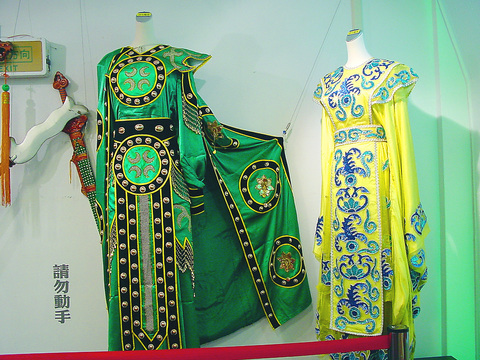For the first time in Taiwan's history, a nearly three-month-long festival devoted to the art of Taiwanese opera has been launched, last month at the National Center for Traditional Arts (國立傳統藝術中心), in Ilan County (宜蘭縣).
Sponsored by Uni-President Yi-Lan Art and Culture Corp (
The main purpose of the festival is to present the history of Taiwanese opera since its inception in Ilan in the early 1900s.

PHOTOS: DEREK LEE, TAIPEI TIMES
Opera started out as a means of outdoor entertainment for Taiwanese farmers and villagers and a way to worship gods on their birthdays. During the 1920s, the Japanese colonial government imposed strict restrictions on opera performances and forced the troupes to sing and act inside theater houses, so the the public could be controlled better.
Some of the well-known troupes were invited to perform in southern Fujianese cities, where people spoke the same Min-dialect.
From 1949 to 1956, when the Chinese Nationalist Party (KMT) took over control of Taiwan the number of registered Taiwanese Opera troupes was more than 500.

As radios, records and film impacted unfavorably on the opera business, the troupes learned to adapt and record their performances.
In the 1960s, however, the opera business was at a low and the number of opera troupes was reduced to about 100. This lasted until the 1970s when TV stations started to organize their own troupes and stage broadcasts of Taiwanese opera.
Many big-name stars such as Liao Qiong-zhi (
As to the content, there have also been changes. Previously, the stories were based on historical and folk legends. Nowadays, opera tries to address modern issues, such as national identity, judicial problems and bilateral relations between Taiwan and China.
Modern-content operas such as Taiwan, My Mother (2000) (台灣我的母親), A Case of a Court Judge (1991, 曲判記), Flower on the Other Side of the Bank (2001, 彼岸花), seem to have caught a new wave of popularity and have created another golden era for Taiwanese opera.

On April 26, The Lancet published a letter from two doctors at Taichung-based China Medical University Hospital (CMUH) warning that “Taiwan’s Health Care System is on the Brink of Collapse.” The authors said that “Years of policy inaction and mismanagement of resources have led to the National Health Insurance system operating under unsustainable conditions.” The pushback was immediate. Errors in the paper were quickly identified and publicized, to discredit the authors (the hospital apologized). CNA reported that CMUH said the letter described Taiwan in 2021 as having 62 nurses per 10,000 people, when the correct number was 78 nurses per 10,000

As we live longer, our risk of cognitive impairment is increasing. How can we delay the onset of symptoms? Do we have to give up every indulgence or can small changes make a difference? We asked neurologists for tips on how to keep our brains healthy for life. TAKE CARE OF YOUR HEALTH “All of the sensible things that apply to bodily health apply to brain health,” says Suzanne O’Sullivan, a consultant in neurology at the National Hospital for Neurology and Neurosurgery in London, and the author of The Age of Diagnosis. “When you’re 20, you can get away with absolute

May 5 to May 11 What started out as friction between Taiwanese students at Taichung First High School and a Japanese head cook escalated dramatically over the first two weeks of May 1927. It began on April 30 when the cook’s wife knew that lotus starch used in that night’s dinner had rat feces in it, but failed to inform staff until the meal was already prepared. The students believed that her silence was intentional, and filed a complaint. The school’s Japanese administrators sided with the cook’s family, dismissing the students as troublemakers and clamping down on their freedoms — with

As Donald Trump’s executive order in March led to the shuttering of Voice of America (VOA) — the global broadcaster whose roots date back to the fight against Nazi propaganda — he quickly attracted support from figures not used to aligning themselves with any US administration. Trump had ordered the US Agency for Global Media, the federal agency that funds VOA and other groups promoting independent journalism overseas, to be “eliminated to the maximum extent consistent with applicable law.” The decision suddenly halted programming in 49 languages to more than 425 million people. In Moscow, Margarita Simonyan, the hardline editor-in-chief of the